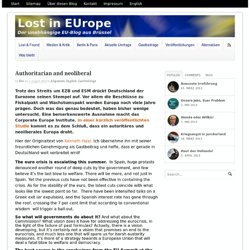

German Wage Moderation and the Eurozone Crisis: A Critical Analysis. It is high time to look more closely at the labor cost competitiveness myth.

Who is responsible for the eurozone crisis? The simple answer: Germany. There is no doubt that the eurozone has performed lamentably in terms of recovering from the Great Recession.

GDP per capita remains well below pre-recession peaks. Eurozone unemployment is close to 11 per cent, compared with 7.5 per cent in 2008. This is what allows George Osborne to talk up UK growth as exceptional, even though in reality it has at best just been at rates that match historical averages. Europe's 11m empty homes. More than 11m homes lie empty across Europe – enough to house all of the continent's homeless twice over – according to figures collated by the Guardian from across the EU.

In Spain more than 3.4m homes lie vacant, in excess of 2m homes are empty in each of France and Italy, 1.8m in Germany and more than 700,000 in the UK. There are also a large numbers of vacant homes in Ireland, Greece, Portugal and several other countries, according to information collated by the Guardian. TroikaWatch. Report denounces the takeover by the Troika. THE_FUNCTIONING_OF_THE_TROIKA_finaledit2afterveronika. Authoritarian and neoliberal. Trotz des Streits um EZB und ESM drückt Deutschland der Eurozone seinen Stempel auf.

Vor allem die Beschlüsse zu Fiskalpakt und Wachstumspakt werden Europa noch viele Jahre prägen. Doch was das genau bedeutet, haben bisher wenige untersucht. Eine bemerkenswerte Ausnahme macht das Corporate Europe Institute. In einer kürzlich veröffentlichten Studie kommt es zu dem Schluß, dass ein autoritäres und neoliberales Europa droht. Hier der Originaltext von Kenneth Haar . The euro crisis is escalating this summer. GermanySpillovers. Prisoners of the Euro. Euro-da-Fé. (Brussels) Nonplussed by this week’s unemployment report showing the Eurozone jobless rate rising to an unprecedented 12%, members of the European Parliament and Europe’s national governments pressed ahead on Wednesday with passage of a stringent new package of austerity measures.

Dubbed “hyperaustérité” or “Übersparpolitik” by its backers, the new program of ruthless cuts and social demolition promises to deliver even higher levels of joblessness, misery and hopelessness than has been achieved so far by earlier rounds of austerity. Along with the new economic measures, the European Union (EU) also announced its intention to change its name to the “European Sadomasochistic Cult.” The new ESC will take the leading role in the implementation of European hyperausterity.
“Nothing is really changing,” stated Dutch finance minister and Eurogroup chairman Jeroen Dijsselbloem. Joseph Stiglitz on the European Recession. “Nobody in Europe” sees a “contradiction” between austerity and growth. By William K.

Black The two most revealing sentences about the gratuitous Eurozone disaster – the creation of the deepening über-Depression – was reported today. The context (rich in irony as I will explain) is that U.S. Treasury Secretary Lew spent his Spring Break in Europe meeting with his counterparts. The Wall Street Journal’s article’s title explains Lew’s mission and its failure: “U.S. Wolfgang Schäuble is Germany’s finance minister. Schäuble’s economic policies (austerity) have proven catastrophic.
“Thus in January 2011 Olli Rehn, a vice president of the European Commission, praised the austerity programs of Greece, Spain and Portugal and predicted that the Greek program in particular would yield ‘lasting returns.’ Europe’s youth generation – crushed by the euro austerity folly. EU banks may face up to 230 bn euros sector deficit: JP Morgan. Europa im Würgegriff der Banken. Ein sehr guter Artikel, soweit es die Ist-Situation betrifft. Eine Restrukturierung der Verbindlichkeiten ist sicher das kleinere Übel gegenüber einem Mega-Bailout auf Kosten der Allgemeinheit (würde auch die Richtigen treffen, nämlich die Gläubiger), aber es trifft nicht die Ursache des Problems.
Die Ursache ist vielmehr die nahezu grenzenlose Verfügbarbar von Geld, das von den Banken (über die Zentralbanken) buchstäblich aus dem Nichts geschaffen wird (und natürlich auch zuerst den Geschäftsbanken zur Verfügung steht). Die Banken tun damit, was ihre Aufgabe ist und was sie am Besten können, und die Kreditnehmer saugen sich mit billigem Geld voll, als gäbe es kein Morgen und keine Tilgung. Aus China kam ein interessanter Vorschlag zur fundamentalen Lösung dieses Problems: Währungen sollten durch Vorhalten eines Rohstoffkorbs (wenigsten teil-)gedeckt sein.
Eine Alternative dazu wäre natürlich der gute alte Goldstandard. Bankenrettung als Farce. Von Lucas Zeise Wir sind wieder da, wo wir drei Jahre zuvor auch schon waren.

Punk Economics: Lesson 1. Robert Mundell, evil genius of the euro. The idea that the euro has "failed" is dangerously naive.

The euro is doing exactly what its progenitor – and the wealthy 1%-ers who adopted it – predicted and planned for it to do. That progenitor is former University of Chicago economist Robert Mundell. The architect of "supply-side economics" is now a professor at Columbia University, but I knew him through his connection to my Chicago professor, Milton Friedman, back before Mundell's research on currencies and exchange rates had produced the blueprint for European monetary union and a common European currency. Mundell, then, was more concerned with his bathroom arrangements. Professor Mundell, who has both a Nobel Prize and an ancient villa in Tuscany, told me, incensed: "They won't even let me have a toilet. German Economic Striving at the Expense of Workers and Neighbors Will Backfire.
February 21, 2012 | Like this article?

Join our email list: Stay up to date with the latest headlines via email. Unemployment in Germany is now at a 20 year low and the country’s economy seems to be impervious to the strains afflicting its neighbors in the economic periphery- notably, Greece, Portugal, Italy and Spain. So shouldn’t everyone else be copying Germany’s model? But hold on a minute. Cara Chanceler Merkel.
Sehr geehrte Frau Bundeskanzlerin Merkel, Zuallererst möchten wir darauf hinweisen, dass wir uns an Sie als Kanzlerin der Bundesrepublik Deutschland wenden, und zwar nur als solche.

Germans and Aliens. The Times has an article today about Germany’s faith in austerity as the answer to depression. Die Top-Ökonomen: Kemal Dervis - Weg mit den deutschen Exportüberschüssen. It’s the imbalances, stupid - macrobusiness.com.au. Nicht die Staatshaushalte sind das Kernproblem der Euro-Zone, sondern die Ungleichgewichte in der Wettbewerbsfähigkeit der Mitgliederländer
4.6.2012, 00:01 Uhr. The causes: A very short history of the crisis. The meaning of "solidarity" in the eurozone. 4 June 2012Last updated at 20:20 ET By Michael Goldfarb Writer and broadcaster Supporters of European integration have always been keen on the idea of "solidarity" between nations. It's not a word heard so much in the Anglo-Saxon world - but at this time of crisis, perhaps examples from American history hold useful lessons? European Union technocrats use the word "solidarity" a lot these days. There is a Difference Between Greece and the US » If we learn the wrong lessons from Greece, our social safety net may wind up in tatters. Many market analysts, commentators and economists claim to be having a hard time finding a metric in which the US is in better financial shape than Greece. What really caused the eurozone crisis? How-underpaid-german-workers-helped-cause-europes-debt-crisis. The eurozone crisis is not about market discipline.
Washington, DC - The people who gave us the eurozone crisis are working around the clock to redefine it in order to profit politically. Their editorials - run as news stories in media outlets everywhere - claim that the euro crisis is a story of profligate governments being reined in by the bond market.
This is what is known in economics as a "lie". The eurozone crisis is most definitely not a story of countries with out of control spending getting their comeuppance in the bond market. Prior to the economic collapse in 2008, the only country that had a serious deficit problem was Greece. Eurozone in crisis in graphics: Deficit. Continue reading the main story EU rules say that countries using the euro are not allowed to have an annual deficit of more than 3% of GDP, but several countries have failed to keep to that rule in recent years.
Note that Germany, Italy and France were all among the first countries to break the Maastricht rule during the last decade, while Spain and the Republic of Ireland ran surpluses before the 2008 crisis. Since 2008, peripheral economies such as Spain, Greece and Portugal have run big deficits, because their economies have slumped, generating less tax revenues and requiring more unemployment benefit payments. Ireland experienced an exceptionally enormous deficit of 31% of its GDP in 2010, largely due to the cost of rescuing its banks. Italy, however, has faired surprisingly well.